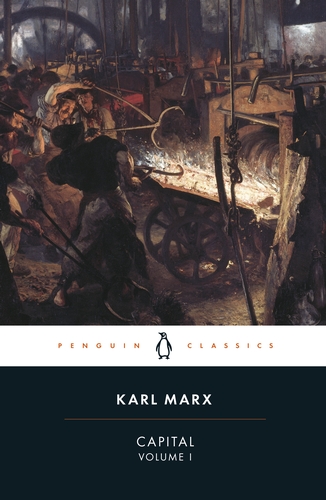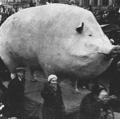hidden abode reviewed Capital: Volume 1 by Karl Marx
"No admittance except on business"
5 stars
This is the NLR/Penguin Books edition of the first volume of Marx's magnum opus, as translated by Ben Fowkes. It is currently (as of 2021) the best English-language edition of Capital, far surpassing the old Moore/Aveling translation in readability and clarity. In addition to a lengthy introduction by Ernest Mandel (which can be safely skipped), it has an appendix containing one of Marx's unpublished manuscripts, the so-called "Results of the Immediate Process of Production." Until the publication of the new North & Reitter translation of Capital, this is the only edition worth buying.
The first volume of Capital begins with the analysis of the commodity-form and ends with the general law of capitalist accumulation and the historical origins of capital as a relation of production (so-called "primitive accumulation"). This organization is far from arbitrary; Marx proceeds from the most abstract categories and builds on them to introduce more and more …
This is the NLR/Penguin Books edition of the first volume of Marx's magnum opus, as translated by Ben Fowkes. It is currently (as of 2021) the best English-language edition of Capital, far surpassing the old Moore/Aveling translation in readability and clarity. In addition to a lengthy introduction by Ernest Mandel (which can be safely skipped), it has an appendix containing one of Marx's unpublished manuscripts, the so-called "Results of the Immediate Process of Production." Until the publication of the new North & Reitter translation of Capital, this is the only edition worth buying.
The first volume of Capital begins with the analysis of the commodity-form and ends with the general law of capitalist accumulation and the historical origins of capital as a relation of production (so-called "primitive accumulation"). This organization is far from arbitrary; Marx proceeds from the most abstract categories and builds on them to introduce more and more concrete categories. One consequence of this method of presentation is that the beginning chapters are generally regarded as the most difficult. Unfortunately this is an unavoidable problem, as the abstract categories at the beginning (chiefly "value") are necessary to understand the more concrete subjects at the end.
Although Capital is a rich text, in this review I would like to single out two recurring themes which I think are most intellectually and politically salient.
Firstly, the domination of capital. Throughout the text, Marx emphasizes a kind of peculiar subject-object inversion. Although capital is the result of human activity, the imperative to accumulate capital means that human activity is constrained and directed by capital. "Just as man is governed, in religion, by the products of his own brain, so, in capitalist production, he is governed by the products of his own hand" (p. 772).
This imperative is not merely the result of greedy capitalists who could, in theory, be replaced by kinder, gentler ones. Competition between capitals ensures that only capitalists who are successful at accumulation will remain in business; "[u]nder free competition, the immanent laws of capitalist production confront the individual capitalist as a coercive force external to him" (p. 381).
It is, of course, the worker who feels the brunt of this arrangement, who becomes a mere means for the accumulation of capital. The worker must sell their labor-power, in turn surrendering their freedom for the remainder of the workday. The imperative to accumulate capital drives the capitalist to remove all physical and moral obstacles to the maximum exploitation of the worker.
Secondly, the inadequacy of political economy. In the famous section on the "fetishism of commodities," Marx points out how the capitalist mode of production spontaneously generates forms of thinking which mystify the actual structure of capitalist production. Rather than penetrating this kind of everyday consciousness, political economy unwittingly reproduces it.
Take, for instance, value. Products of labor only "have value" within the context of commodity production and exchange. It is a "purely social" category; value is an emergent property of the actions of all producers in society. To each individual producer, however, the fluctuations of value appear to be something out of their control. Therefore, value comes to be seen as something natural inhering to products. Political economy, however, does not ask why value exists, but merely assumes that it is a universally applicable category.
Political economy, of course, has changed since 1867, when this volume was published. Many of Marx's specific critiques of 19th century political economy are irrelevant to modern neoclassical economics. The central critique, however — that political economy fails to reflect on the historically and socially specific nature of its categories — remains just as powerful.

